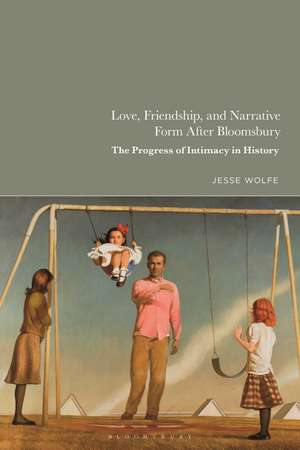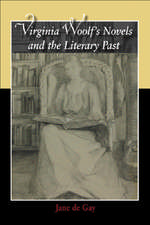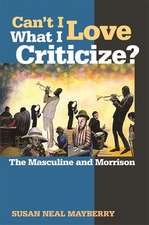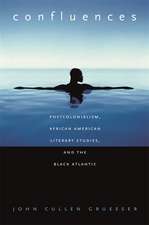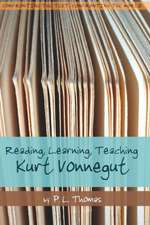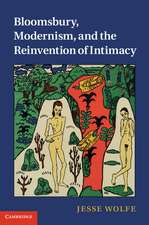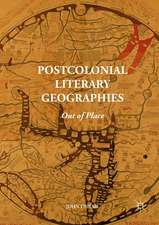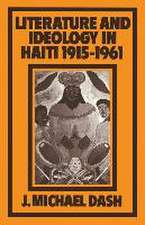Love, Friendship, and Narrative Form After Bloomsbury: The Progress of Intimacy in History
Autor Jesse Wolfeen Limba Engleză Paperback – 24 iul 2024
| Toate formatele și edițiile | Preț | Express |
|---|---|---|
| Paperback (1) | 192.48 lei 6-8 săpt. | |
| Bloomsbury Publishing – 24 iul 2024 | 192.48 lei 6-8 săpt. | |
| Hardback (1) | 509.52 lei 3-5 săpt. | |
| Bloomsbury Publishing – 11 ian 2023 | 509.52 lei 3-5 săpt. |
Preț: 192.48 lei
Preț vechi: 249.97 lei
-23% Nou
Puncte Express: 289
Preț estimativ în valută:
36.83€ • 38.56$ • 30.55£
36.83€ • 38.56$ • 30.55£
Carte tipărită la comandă
Livrare economică 09-23 aprilie
Preluare comenzi: 021 569.72.76
Specificații
ISBN-13: 9781350328860
ISBN-10: 1350328863
Pagini: 272
Ilustrații: 10 bw illus
Dimensiuni: 156 x 234 x 25 mm
Greutate: 0.4 kg
Editura: Bloomsbury Publishing
Colecția Bloomsbury Academic
Locul publicării:London, United Kingdom
ISBN-10: 1350328863
Pagini: 272
Ilustrații: 10 bw illus
Dimensiuni: 156 x 234 x 25 mm
Greutate: 0.4 kg
Editura: Bloomsbury Publishing
Colecția Bloomsbury Academic
Locul publicării:London, United Kingdom
Caracteristici
Explores modernism's complex expressions of historical hope and its mixed attitude towards the idea of progress (specifically as applied to intimacy) as a counterpoint to the alienation and despair so often associated with the movement
Notă biografică
Jesse Wolfe is a Professor of English at California State University Stanislaus, USA and is the author of Bloomsbury, Modernism, and the Reinvention of Intimacy.
Cuprins
List of tables and appendices List of images Acknowledgments Dedication * * * Introduction Historical Despair and Bloomsbury's Enlightened Modernism Chapter 1 Do things get better?- Bloomsbury, Private Lives, and Dreams of Progress Chapter 2 Woolfian Pessimism: Rachel Cusk's Vision of Paralysis Chapter 3 Post-Freudian Skepticism: Atonement in an Age of De-conversion Chapter 4 Post-Freudian Hope: Regeneration in an Incredulous Milieu Chapter 5 Forsterian Skepticism: Transcontinental Eros in The Satanic Verses Chapter 6 Forsterian Optimism: Zadie Smith's Post(?)-Realist Homage Chapter 7 Woolfian Optimism: Michael Cunningham's Modernist Homage Chapter 8 Bloomsburian Horizons: Intimacy in a Polyamorous Light * * * Appendices Notes Bibliography Index
Recenzii
Jesse Wolfe's important new book offers a convincing reconsideration of the Bloomsbury Group's impact on the contemporary novel and, more broadly, on the freedom to live and love in fulfilling ways. Love, Friendship and Narrative Form After Bloomsbury makes a compelling argument for the continuing vitality of the modernist paradigm: as solace, as exemplar, and as inspiration. Through nuanced readings of works by Rachel Cusk, Michael Cunningham, Zadie Smith and others, Wolfe mounts a persuasive sociological argument for the capacity of the contemporary novel to enlarge its readers' emotional intelligence. The book risks asking if the expanded - and hard-fought -- sexual freedoms of the post-Freudian era have made us happier? and answers with a resounding affirmative. In Wolfe's hands, the contemporary novel, inspired by the inventions of Bloomsbury modernism, is recast as nothing less than a guide to private life, past and present - and to future possibilities, as well.
Engrossing and stimulating, Wolfe's Love, Friendship, and Narrative Form After Bloomsbury: The Progress of Intimacy in History is that rare breed of book which simultaneously informs, discovers, and enchants. Boldly bridging times and media, it focuses on the legacy of the innovation in the understanding and representation of intimacy that the Bloomsbury Group and its co-travellers bequeathed to intellectual and social history. As the Bloomsbury public and private sphere interventions (interracial, same-sex, and polyamorous forms of intimacy and challenging of amatonormative values) and correlative transformations in narrative form changed the modes in which we perceive and articulate intimacy through lenses of despair and hope, they made the future generations of artists and audiences appreciate the impact of historical forces on intimate feelings and relationships and our creative capacities to engage with and alter these forces. Wolfe's book focuses on these dialogues with fervour and rigour. Texts by Rachel Cusk, Zadie Smith, Michael Cunningham, Pat Barker, and Salman Rushdie receive sparkling readings when emplaced in metamodernist, 'metabloomsbury' contexts; in turn, modernists texts by Wolf, Forster, Freud, Lawrence, and Joyce reappear in a fresh light and with new urgency. Sweeping across the arcs of social history and thinking about intimacy in the long twentieth century, and adroitly shifting between vast sociological vistas and close textual analyses, Love, Friendship, and Narrative Form After Bloomsbury: The Progress of Intimacy in History revisions the position and real-world impact of the creative interventions in the discourse of intimacy in the ways that appear both hermeneutically useful and socially necessary.
Engrossing and stimulating, Wolfe's Love, Friendship, and Narrative Form After Bloomsbury: The Progress of Intimacy in History is that rare breed of book which simultaneously informs, discovers, and enchants. Boldly bridging times and media, it focuses on the legacy of the innovation in the understanding and representation of intimacy that the Bloomsbury Group and its co-travellers bequeathed to intellectual and social history. As the Bloomsbury public and private sphere interventions (interracial, same-sex, and polyamorous forms of intimacy and challenging of amatonormative values) and correlative transformations in narrative form changed the modes in which we perceive and articulate intimacy through lenses of despair and hope, they made the future generations of artists and audiences appreciate the impact of historical forces on intimate feelings and relationships and our creative capacities to engage with and alter these forces. Wolfe's book focuses on these dialogues with fervour and rigour. Texts by Rachel Cusk, Zadie Smith, Michael Cunningham, Pat Barker, and Salman Rushdie receive sparkling readings when emplaced in metamodernist, 'metabloomsbury' contexts; in turn, modernists texts by Wolf, Forster, Freud, Lawrence, and Joyce reappear in a fresh light and with new urgency. Sweeping across the arcs of social history and thinking about intimacy in the long twentieth century, and adroitly shifting between vast sociological vistas and close textual analyses, Love, Friendship, and Narrative Form After Bloomsbury: The Progress of Intimacy in History revisions the position and real-world impact of the creative interventions in the discourse of intimacy in the ways that appear both hermeneutically useful and socially necessary.
